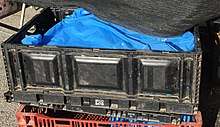Ifco tray
Ifco trays (an acronym for Internal Fish Container) are containers developed in France in 1985 which are primarily used in retail to transport fish, also being used to hold fruit and vegetables.[1][2][3]

They are attractive for environmental reasons due to their ease of reuse, their capability of being stacked when full of produce in many different configurations and that they can be flattened when empty for compact return to producers/shippers/growers or for storage purposes.
Controversy
Their adoption has generated controversy between developed countries which are consumers of produce and developing countries which are producers, primarily due to the cost of using the trays as opposed to using locally produced containers. In particular, many developing countries lack the capital-intensive infrastructure to develop and support the hi-technology plastic molding machinery necessary to produce the returnable trays. Analysis continues to compare the relative benefits of reusable trays, which require a full cycle (use, cleaning and return) versus one-time-use disposable containers which do not require return to the shipper, but instead are disposed of after one use. Disposable containers create a waste-disposal burden on recipients while the returnable containers burden producers who must purchase containers and arrange for a return cycle...[4]
References
- Fishbein, Bette K. (1994). Germany, Garbage, and the Green Dot: Challenging the Throwaway Society. Cincinnati, Ohio: Risk Reduction Engineering Laboratory, Office of Research and Development, U.S. Environmental Protection Agency. pp. 25–26. ISBN 978-0-7881-3193-6.
- "IFCO RPC Management Services". IFCO SYSTEMS, Germany. Archived from the original on 2010-04-12. Retrieved 2010-03-29.
- "US Patent Issued to IFCO Systems on March 5 for "'Fish Crate' Collapsible Container for Transporting Fresh Fish" (German Inventor)". US Fed News Service, Including US State News – via HighBeam (subscription required) . 5 March 2013. Archived from the original on 24 September 2015. Retrieved 13 April 2015.
- Environmental Requirements and Market Access - Chapter 20. Organization for Economic Cooperation and Development. 2005. pp. 270–274. ISBN 978-92-64-01374-2.